|
Harrier GR.3
by
Piero De Santis
|
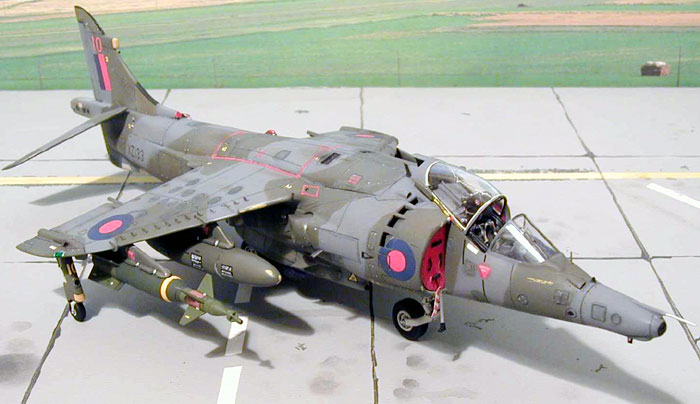 |
|
Harrier GR.3 (serial
XZ133 code 10) |

HyperScale is proudly supported by
Squadron.com
Here is my latest Harrier. This time it is an RAF Harrier GR.Mk.3
(serial XZ133 code 10) during the Falklands War in 1982.
For that war, the RAF's original intention was to use the Harriers GR.3s
as "fighters", armed with air-to-air missiles, anticipating a high ratio
of Sea Harrier losses.
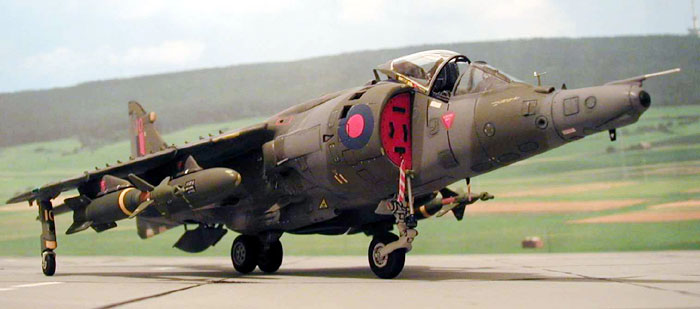
Fortunately for the British forces, this did not happen, so the GR.3s
went back to their primary role: Close Air Support (CAS).
This particular Harrier GR.3 "XZ133" flew the last LGB mission during
the day of the Argentine forces surrender. When the "white flag" was
seen waving over Port Stanley, the aircraft was called back to the HMS
Hermes carrier, a few minutes before the release of the bombs over an
Argentine HQ.
As with the 1/48 scale Harrier GR.3 in my previous article, I used a
Monogram’s AV-8A for the fuselage, wings, undercarriage, nozzles,
airbrake, cannons pods and pylons. I used the the tail fin, RWR cone,
intakes, drop tanks and the front section of the fuselage with the clear
parts from an Airfix GR.3 kit.
Furthermore, I decided to use the LRMTS resin nose included in the
Missing Link’s conversion set because this piece has a better shape than
Airfix’s, and included the transponder bulge.
Some of the GR.3s used during the war were fitted with the “Blue Eric”
ECM package in place of the starboard Aden gun pod and the chaff
dispensers aft the ventral airbrake. The "XZ133" was one of those.
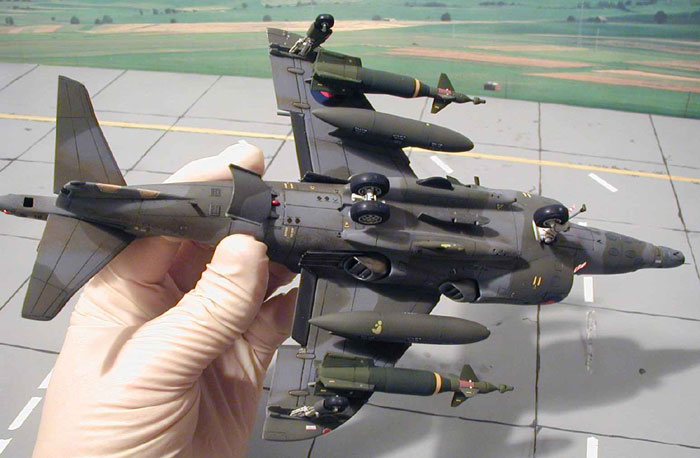
I loaded the model with a pair of CPU-123B 1000lb laser guided bomb:
this came from the Amraam Line resin weapons set.
The cockpit I used is the resin set from Neomega, designed for the Sea
Harrier FRS.1: I replace the instrument panel and modified the ejection
seat in a Martin Baker Mk.9.
Instrument panel, wing fences, antennas and other small details came
from Airvawes’s etched sheet for Harrier GR.3.
The inboard access ladder has been scratch build and added under the
starboard intake, because the canopy is placed in the open position.
I rescribed all the panels and engraved some rivets on the model.
All the GR.3s carried the standard RAF matt Dark Green and Dark Sea
Grey wrap-around scheme. The squadron markings on the nose were over
painted.
I used enamels Humbrol 164 Dark Sea Grey and 163 Dark Green for the
entire model. Pre-shading with black enamel was applied and black-ink
for the panelling.
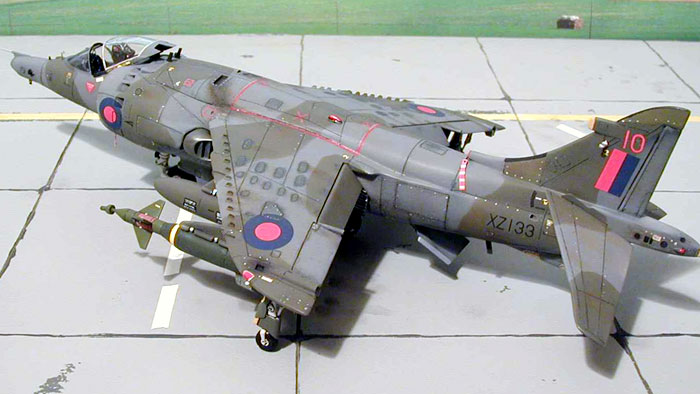
There are not so many clear colours pictures for the Harrier GR.3s
during the Falklands War, but few of those pictures shows that the main
access panels on the aircraft were "roughly" painted with a sealant.
This was reproduced on my model using a satin-gloss darker shade of the
camouflage colours.
Some FOD blankets were scratch build with plasticard, painted red, and
placed inside the engine intakes and on the tail intake with "RBF" tags.
I used the Aztec "All Harriers" decal sheet dedicated to the "metal
wing" Harriers, including also the RAF Harrier GR.3s used in the
Falklands War. This is a beautiful decal sheet with all the stencils you
need.
To be noted is the code in red colour on the tail and in yellow on
the outrigger wheels.
Important note: there were many debates about "what's happen to the
roundels" over the GR.3's wings during the conflict... Rumours, also
from RAF sources, and some books tell the story that those roundels were
over painted with Dark Green paint for low-viz reason.
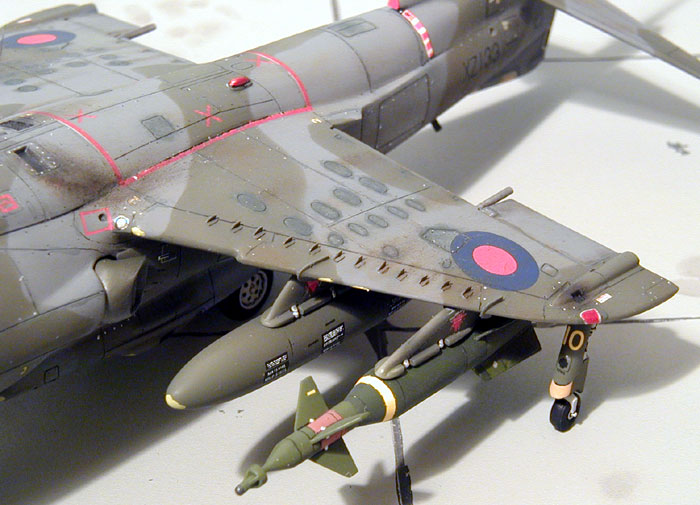
In the end, this is not "officially" proved or confirmed, and the
colour pictures shows the roundels still in place. In my opinion, this
is not the "absolute truth", because those pictures were taken at the
begin of the deployment, and many said that this paint job was done
later... but with nothing "clear" on the other side... the six roundels
are all in place.
A special thanks goes to all the fellows of the Harrier & JSF SIG, for
all the precious information and references provide that can be found on
their website:
http://harrier.hyperlinx.cz/ .
Happy Modelling!
Piero
Click on the thumbnails
below to view larger images:
|
Home |
What's New |
Features |
Gallery |
Reviews |
Reference |
Forum |
Search